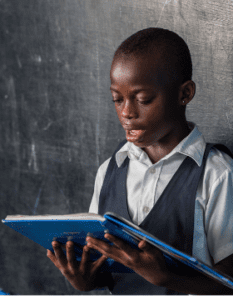 In Liberia, and many other countries in sub-Saharan Africa, it is common to find teenage girls sitting in grade 1 or 2 classrooms. This signals a deep hunger for education but also presents a fundamental barrier to girls receiving quality education, or any education at all.
In Liberia, and many other countries in sub-Saharan Africa, it is common to find teenage girls sitting in grade 1 or 2 classrooms. This signals a deep hunger for education but also presents a fundamental barrier to girls receiving quality education, or any education at all.
Over-age enrollment remains a civil war legacy in many post-conflict countries. But there are other persistent economic and social challenges that lead to high prevalence of over-age girl students, including a disproportionate burden of care for younger siblings and household chores. Over-age girls are at greater risk of dropping out either because they get dissuaded, contend with teenage pregnancy and early marriage, or are approached for transactional sex in return for grades. Without an education, girls have fewer job opportunities, less control over household resources and are more susceptible to domestic violence.
Over-age girls need to advance quickly if they are to have a fighting chance at completing primary school and successfully transitioning into secondary education.
CODE’s Girls’ Accelerated Learning Initiative supports over-age girl students to accelerate their learning so that they can be advanced to an age-appropriate grade.
The initiative was first piloted in 2017-2018 with 173 over-age girls in grades 1-3 in five Liberian schools. Each specially-trained teacher worked closely with 10 over-age girls in this after-school program focused on improving reading, writing, math and life skills. Of the 173 participants, 84% were promoted to the next grade level and 4% were promoted 2 grades after only one semester.
The program was expanded to 25 schools in 2018-2019, and the student/ teacher ratio reduced to 1:5. These smaller groups yielded even greater returns in term of academic performance. As a result of the program, 75% of participating girls were recommended for double promotion – meaning they advanced two grades in one year. A further 22% of girls were promoted to the next grade. While that may seem “normal”, many would have dropped out or been kept back again because they had failed to master foundational reading skills.
This program model has been proven to address an urgent need and to deliver measurable impact on the learning outcomes of over-age girls. It has shown that innovations like remedial lessons and life-skills training need not be expensive or difficult.
The key to social impact is focus and scale. For this reason, we are seeking strategic funding partners to enable continued expansion of the Girls’ Accelerated Learning Initiative. The impact will be felt both immediately and well into the future as children of mothers who can read are 50% more likely to live past the age of five; 50% more likely to be immunized, and twice as likely to attend school.
For the sake of more than a half million over-age girls in Liberia alone, and many more like them across the continent, we hope that you will share CODE’s interest in prioritizing this area of work.


